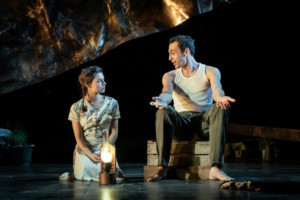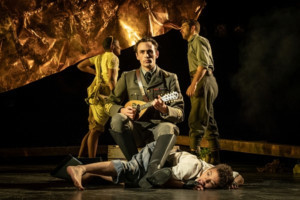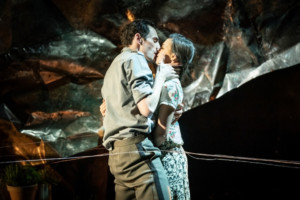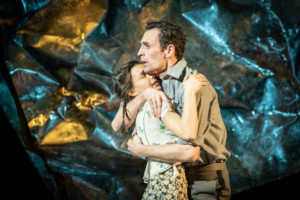Interview: Madison Clare Talks CAPTAIN CORELLI'S MANDOLIN at Harold Pinter Theatre

in Captain Corelli's Mandolin on tour
After a stellar debut at Rose Theatre Kingston and a tour around the UK, Captain Corelli's Mandolin has landed in the West End at the Harold Pinter Theatre, officially opening last night.
Louis de Bernières's novel is adapted by Rona Munro, directed Melly Still, and stars Alex Mugnaioni as the title character and Madison Clare, who plays young and decisive Pelagia. We caught up with the actress to learn how the play has changed from its debut and the overwhelming success of the book.
What's Captain Corelli's Mandolin about?
I'd say it's about how love, in many different forms, and how it survives under the pressure of war. It's told through many visual forms, music and movement in many different ways by many artists and creatives.
Were you familiar with the story?
I was, it's my favourite book! When I heard that it was going on, I knew I had to audition for it. I always wanted to play Pelagia, so I got in touch with my agent and ended up going for it. I'm really happy that I get to play the role I wanted from a book I love. It's quite a challenge - fitting any book into a play or a film is an undertaking in itself. You just want to be able to do it justice. I'm hoping that we all have, from Rona [Munro] who wrote it, to Melly [Still], who directed it, and down to us. I mean, I think it's going well...
Why do you think the story's had such massive success?
I think it's complicated, intricate, and it shows war from many points of view. It has a number of storylines from different types of people, whether they're fighting or at home. It's about how it affects those on the island, how it affects the soldiers, and the relationships between them - whether it's romantic love, or between a father and his daughter, a mother and a son. It becomes not only about the war, but about people watching how the relationships survive underneath it.

Captain Corelli's Mandolin on tour
Are there any differences between the original material and the play?
Well, Rona couldn't fit everything in. There's times where the characters have been combined as one, or others couldn't make it. And it's a difficult thing to portray war on stage, so we've done it the best we can with movement and music. Things have been compressed a little bit. But I do think she's done a great job of fitting as much as she could.
Carlo and Francesco's storyline didn't make it into the film at all but it's given air in this, it's given time - we get to know Carlo more as a character, in particular. He's key and is a prominent heartbeat throughout this whole play. His storyline is a beautiful one to watch.
There were obviously some beautiful chapters in the book where you're like "Aw, I wish that made it in", but we just don't have the time - things have got to be cut. But the necessary things have been kept.
Do the politics of World War II have a role in the play?
They're definitely in the play. They don't take a front seat, because it's more about exposition and how war affects the characters in it, but the politics of the time, what each country's involvement is in the war, how they view each other and their leaders, how it splits the village itself on the island because they don't all believe the same thing - it's all there and it all contributes to the story. It's very relevant. It's just not the defining plot line.
The company is quite international - you have Greek heritage and Alex Mugnaioni, who's playing Corelli, has Italian blood. What's the situation with the accents and nationalities?
We all use our own accents, so one is doing bad Italian accents. We've got quite an array - everyone's got a different one. It's important to be native, but because we're all speaking English, we do have Greek and Italian lines opening the scene. It's quite a complicated structure that we've put in place.
If an Italian opens the scene and there are other people from different countries in there, the first line would be said in Italian until we're all talking the same language. But otherwise, I don't know how much of a factor our nationalities came into it. I think it's helped - it's in our bodies and in our culture and it comes through. It came through in the audition, I think, because Alex and I are not the only ones to be cast in line with our characters.

in Captain Corelli's Mandolin on tour
Joseph Long, who plays my father, is Italian, even though he plays a Greek, and Italians and Greek are very similar. They've got the same family values and expressions - I think there's a crossover. Eve Polycarpou is Greek Cypriot like I am, and so is Stewart Scudamore, who plays Velisarios. There's a number of different nationalities going on, but we're all playing toward the same thing.
Although it helps, I don't feel like it makes a huge difference and I don't think anyone in the cast does either. I think that if we were all doing dodgy Italian or Greek accents, there might be a different problem!
Tell us about your character, Pelagia.
She is a new way of thinking in what is a very traditional culture and society. She's very strong-willed, independent and feisty. She is totally open and responsive to new ways of thinking. She doesn't understand the restrictions of the old ways. I think in some way, because she's so young, she doesn't really understand war itself.
She's 17 when the play starts, so she hasn't had a firsthand experience of war. She really doesn't understand the dangers of it until they come to her. I think even when she understands it, she doesn't care. I don't think there's any point in shying away from that. She's constantly being told that she can't do things. As a woman in a society like that - it's the 1940s in Greece - there are more restrictions than there would be now.
The moment Corelli comes in, he's something that she wants and she's been told that she can't. But she's like, I can! It's quite a big statement for her to make. I love her.
Has the play changed since you first put it on stage at the Rose Theatre Kingston?
I think when any play first starts out, you're still discovering it. We're still discovering it now, but it's been three months, so the discoveries are smaller. For me personally, I found more ownership of it. When you first start, you've got a basic foundation and you're trying to make choices with the character, but I felt like I was still getting to know her.
Then, also getting to know the people around me and seeing the play through their eyes. They're making discoveries as well, and as they're making them, you're getting to know new things too. I think my character is definitely bolder than she was at the beginning. I'm stronger in my decisions and I presume other people are too.
There's a fine balance between every line and every thought when it comes to her - she can come across quite biting at times. She's always playing games with Corelli because he's the enemy, she's fighting her feelings. It's about finding the balance in every single line and how far she's going to push it, how much she needs to hold back, how sensitive she needs to be, how strong she needs to be.

in Captain Corelli's Mandolin on tour
I know that Alex is finding the same things and Ashley [Gayle] is finding more things in his portrayal of Mandras. Joseph and I have been exploring our relationship together as father and daughter, and that's becoming stronger too. It's become slicker, as well. The play's become tighter and quicker. We got to know our surroundings and each other.
What can audiences expect and what would you like them to take from the play?
I think this play is open to interpretation. I've not had someone come and have the same opinion as the next person. I think everyone leaves with a different storyline they connected with and a different character who's moved them, different emotions. That includes my own character - I've had friends who empathised with her and others who thought I was a bit harsh.
I think audiences can expect to be moved, entertained, and enjoy innovative visuals and movement and music. They can take what they want from it, really. The ending is very controversial - I think people will have different views on what happens. We stuck with the storyline of the book, so I think fans will be very happy.
Captain Corelli's Mandolin runs at Harold Pinter Theatre until 31 August.
Videos
